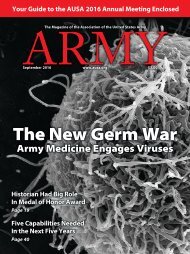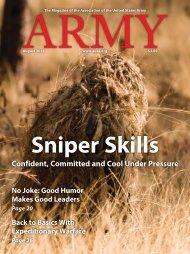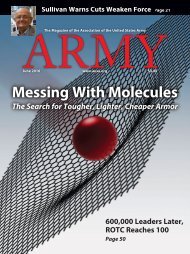All About - History - Hitler Versus Stain
All About History offers a energizing and entertaining alternative to the academic style of existing titles. The key focus of All About History is to tell the wonderful, fascinating and engrossing stories that make up the world’s history.
All About History offers a energizing and entertaining alternative to the academic style of existing titles. The key focus of All About History is to tell the wonderful, fascinating and engrossing stories that make up the world’s history.
Create successful ePaper yourself
Turn your PDF publications into a flip-book with our unique Google optimized e-Paper software.
AMAZING STORIES<br />
<br />
ALL ABOUT<br />
YOUR HISTORY<br />
<br />
Share your past with us<br />
94<br />
SHARE & WIN<br />
Share your history with<br />
us and win a fantastic<br />
selection of history books<br />
worth more than £50 if<br />
your letter is selected for<br />
publication including The<br />
Bitter Taste Of Victory by<br />
Lara Feigel.<br />
Photos<br />
Scans of snaps that<br />
offer insight to the past<br />
PLUS:<br />
One year’s FREE<br />
subscription<br />
to <strong>All</strong> <strong>About</strong> <strong>History</strong><br />
WE WANT YOUR...<br />
Antiques and<br />
objects<br />
Show off your family heirlooms,<br />
mementos and retro curios<br />
Letters from the past<br />
Old correspondence can hold a wealth of<br />
historical info and fascinating stories<br />
News clippings<br />
Articles reporting on iconic events<br />
Amazing stories<br />
Interesting or insightful tales passed<br />
down from your ancestors<br />
Eyewitness accounts<br />
Did you witness a historic event in<br />
person? Share it today<br />
Family trees<br />
A chance to boast about famous or<br />
significant ancestors<br />
Send your memories to:<br />
Hannah was brought to the newly built<br />
Liverpool Royal Infirmary, where she<br />
died three weeks after her husband<br />
Drawn from the drain<br />
Chrissie Lawton<br />
A recent trip to the Victorian<br />
Childhood exhibit in the Liverpool<br />
Museum got me thinking about<br />
tracing my grandfather’s family. He<br />
would have been about ten years<br />
old in the 1900s, but we knew almost nothing<br />
about his past, and he refused to speak about it.<br />
The assumption was he had no family, which had<br />
always saddened my dad.<br />
After a brief search, I found him in the 1901<br />
census, aged nine, living with his parents, George<br />
and Hannah Lawton, and his three younger<br />
brothers in an area of Liverpool called Much<br />
Woolton. His father was a master painter and<br />
plumber, and ran a family business in Woolton<br />
Street. Further research revealed the business had<br />
been in the family for three generations. As the<br />
eldest son, my granddad would have been groomed<br />
as an apprentice, just as his father and grandfather<br />
had been before him. The emerging picture showed<br />
a loving and prosperous family yet by the census<br />
of 1911, the family had disappeared. What had<br />
happened in those crucial ten years?<br />
A logical starting point was to trace the fate<br />
of my great-grandfather, George. I imagined that<br />
the job of a Victorian plumber was not for the<br />
fainthearted! Victorian Liverpool, like many other<br />
industrialised cities, suffered poverty, overcrowding<br />
and poor sanitation. Open ‘middens’, sewers and<br />
drains were common and natural breeding grounds<br />
for disease. Many areas around the northwest were<br />
classed as “fever dens” of cholera and typhoid, and,<br />
as a plumber, George would have been particularly<br />
vulnerable. “Draw from the drain its typhoid germ,”<br />
wrote Rudyard Kipling in 1884. Sure enough, death<br />
certificates document not only George’s death<br />
from typhoid in 1902 but my great-grandmother,<br />
Hannah’s, as well. Tragically they had passed away<br />
within a month of each other.<br />
Clinical papers of the time report that the<br />
insidious onset of typhoid was deceptive. With<br />
an incubation period of about two weeks, and<br />
marked by a flu-like malaise and headache, it was<br />
allabouthistory@imagine-publishing.co.uk


















